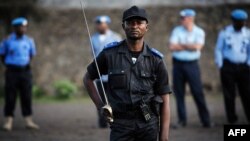GOMA, DRC —
A United Nations police chief in the Democratic Republic of Congo is defending his force against accusations of ineffectiveness in its mission to train Congolese police.
How many United Nations police does it take to train 2,000 Congolese police officers over the course of a year? The answer appears to be about 1,000 - with the help of good interpreters.
General Abdallah Wafy, who commands the police contingent of the U.N. peacekeeping mission in the Congo, MONUSCO, is having difficulty explaining what else his 1,050 officers have been doing in the DRC for the last year - apart from a small amount of training.
He said he will give a brief initial report on his unit’s activities to show it performs an important role but that it needs more funds to do so properly.
The general said the U.N. police, known as UNPOL, have provided basic training to 1,250 Congolese police officers over a six-month period and some training in neighborhood policing to 800 officers over a shorter time frame.
He said that over the past three years, the U.N. has given basic training to a total of 3,500 Congolese police. And he said there had been some specialized instruction in computing for senior officers, but no figures were given for the number trained.
In addition to its 1,050 officers in the Congo, UNPOL employs some 350 specialists. The U.N. police do not perform regular patrols, nor do they have the power to make arrests.
This has led many here to question the effectiveness of such a large training unit, which consists mainly of police from Bangladesh, India, Egypt and Senegal.
Several Congolese journalists have suggested the figure of 1,250 Congolese officers trained was largely insufficient given the needs in the country.
General Wafy agreed.
The problem, he said, is that training costs money -- just training 1,000 Congolese police over six months costs $2.8 million, for example. He appealed to donors to provide more funding so that the UNPOL could get on with training the other 100,000 largely untrained police in the country.
The usefulness of the police contingent has been questioned within MONUSCO for some time. Last year, MONUSCO published an article in one of its brochures stating the force had been searching for a role.
Now with an African peacekeeping force due to arrive to reinforce MONUSCO, and the prospect of downsizing for the rest of the force, there appears to be more pressure to justify the U.N. police’s role.
How many United Nations police does it take to train 2,000 Congolese police officers over the course of a year? The answer appears to be about 1,000 - with the help of good interpreters.
General Abdallah Wafy, who commands the police contingent of the U.N. peacekeeping mission in the Congo, MONUSCO, is having difficulty explaining what else his 1,050 officers have been doing in the DRC for the last year - apart from a small amount of training.
He said he will give a brief initial report on his unit’s activities to show it performs an important role but that it needs more funds to do so properly.
The general said the U.N. police, known as UNPOL, have provided basic training to 1,250 Congolese police officers over a six-month period and some training in neighborhood policing to 800 officers over a shorter time frame.
He said that over the past three years, the U.N. has given basic training to a total of 3,500 Congolese police. And he said there had been some specialized instruction in computing for senior officers, but no figures were given for the number trained.
In addition to its 1,050 officers in the Congo, UNPOL employs some 350 specialists. The U.N. police do not perform regular patrols, nor do they have the power to make arrests.
This has led many here to question the effectiveness of such a large training unit, which consists mainly of police from Bangladesh, India, Egypt and Senegal.
Several Congolese journalists have suggested the figure of 1,250 Congolese officers trained was largely insufficient given the needs in the country.
General Wafy agreed.
The problem, he said, is that training costs money -- just training 1,000 Congolese police over six months costs $2.8 million, for example. He appealed to donors to provide more funding so that the UNPOL could get on with training the other 100,000 largely untrained police in the country.
The usefulness of the police contingent has been questioned within MONUSCO for some time. Last year, MONUSCO published an article in one of its brochures stating the force had been searching for a role.
Now with an African peacekeeping force due to arrive to reinforce MONUSCO, and the prospect of downsizing for the rest of the force, there appears to be more pressure to justify the U.N. police’s role.




